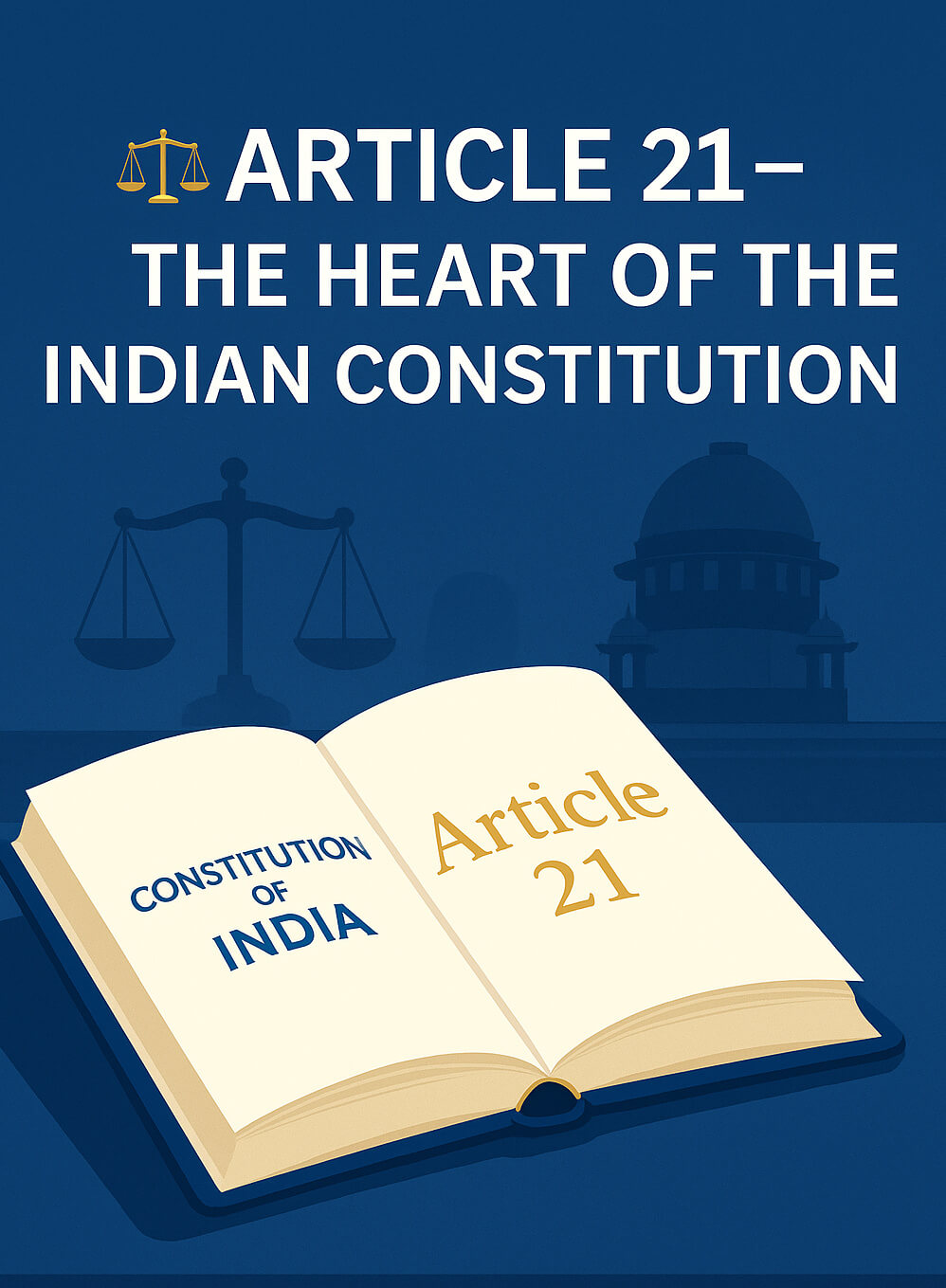
🔒 Right to Privacy | Article 21 of the Indian Constitution ⚖️
The Right to Privacy is one of the most significant rights derived from Article 21 of the Indian Constitution.
It ensures that every individual has the freedom to live life with dignity, autonomy, and control over personal information — without undue interference by the State or others.
This right was not explicitly mentioned in the original Constitution, but it has been recognized as an integral part of the Right to Life and Personal Liberty.
📜 Constitutional Basis – Article 21
“No person shall be deprived of his life or personal liberty except according to procedure established by law.”
The Supreme Court has interpreted “life” and “personal liberty” to include the right to be left alone.
Privacy, therefore, is essential for preserving human dignity and individuality.
⚖️ Landmark Judgment: Justice K.S. Puttaswamy v. Union of India (2017)
In a historic nine-judge bench verdict, the Supreme Court unanimously held that the Right to Privacy is a Fundamental Right under Article 21.
The case arose when Justice K.S. Puttaswamy, a retired judge, challenged the Aadhaar scheme, arguing that it violated citizens’ privacy.
The Court declared privacy to be “the constitutional core of human dignity” and affirmed that it is intrinsic to life and liberty.
This judgment overruled earlier decisions like M.P. Sharma (1954) and Kharak Singh (1962) which had denied privacy as a fundamental right.
“Privacy is the constitutional core of human dignity.”
— Supreme Court of India, 2017
🌐 Scope of the Right to Privacy
- 🏠 Personal Privacy: Protection of home, family, and personal relationships.
- 💬 Informational Privacy: Control over sharing personal data or online information.
- 🧠 Autonomy: Freedom to make personal decisions — marriage, reproduction, gender identity, and medical consent.
- 📱 Digital Privacy: Protection from unlawful surveillance and data misuse in the digital age.
Thus, the right to privacy extends from the physical to the digital, and from personal autonomy to information control.
📘 Key Cases Expanding Privacy Rights
- ⚖️ R. Rajagopal v. State of Tamil Nadu (1994): The “Auto Shankar” case — affirmed privacy against unauthorized publication.
- 🏥 Mr. X v. Hospital Z (1998): Medical confidentiality recognized as part of privacy.
- 📱 Anuradha Bhasin v. Union of India (2020): Internet access and online freedom linked to privacy and free speech.
Together, these cases ensure that privacy is not merely a theoretical right but a practical shield in daily life.
🧩 Privacy in the Digital Age
With rapid technological growth, data collection by governments and private companies has become widespread.
The Right to Privacy ensures that such actions are subject to constitutional safeguards and judicial review.
India’s proposed Data Protection Law and privacy guidelines draw heavily from the Puttaswamy judgment.
🌿 Relationship with Other Rights
The Right to Privacy strengthens other fundamental rights, such as:
- 🗣️ Freedom of Speech (Article 19) – Privacy supports free expression by protecting personal space.
- ❤️ Right to Dignity (Article 21) – Privacy is central to living with dignity.
- 💻 Right to Digital Access – Protects personal liberty in the online world.
👉 Learn more about the broader Right to Life and Personal Liberty under Article 21.
📘 Free Study Material for Law Students!
Download our FREE study material prepared by Delhi Law Academy’s expert faculty.
💬 Frequently Asked Questions on Right to Privacy in India
💬 Informational Privacy – Control over sharing personal data.
📱 Digital Privacy – Protection from unlawful online tracking or surveillance.
❤️ Autonomy – Freedom to make intimate personal decisions.
– Government or corporate surveillance.
– Data misuse without consent. The Supreme Court in Anuradha Bhasin v. Union of India (2020) also linked digital access and free speech to privacy.
Contact us
📍 Delhi Law Academy – Jaipur Branch
6C, Tower 2, Coaching Hub, Pratap Nagar, Jaipur – 302033
📞 Phone:
+91 9911916552
+91 8447285606
✉️ Email:
contactus@delhilawacademy.com

